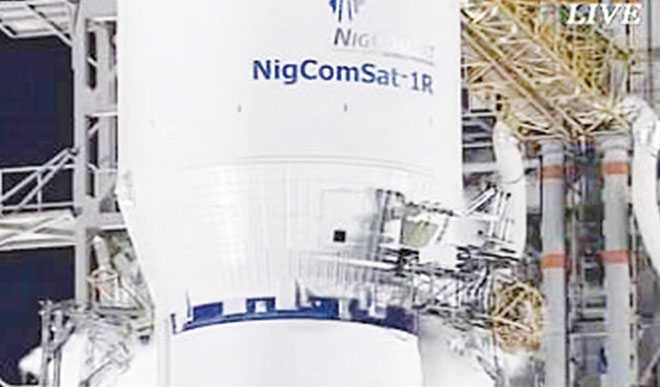Mr Adebayo Banjo, the Chief Executive Officer of Disc Group of companies has called on the Federal Government to sell the country’s satellite, Nigcomsat-1R to the private sector.
Banjo made the call in an interview with the News Agency of Nigeria (NAN) on Friday in Lagos.
He said that handing over the satellite to the private sector would allow for better management and proper utilisation within the country and in Africa.
”Government should sell it to private concerns even if it means a certain per cent of the bandwidth is reserved for government use.
”What other option is there? Remember that a satellite has a fixed lifespan, and as the years pass, its value reduces.
”If the private sector put money into it, they will not only want to get their investment back, but make profit and this can only be done by utilising the satellite,” IT expert said.
According to him, those managing the satellite have not marketed its services well, hence the poor patronage.
The former president of the Nigeria Internet Group (NIG) said that those managing the satellite forgot that customers had other choices apart from Nigcomsat-1R.
”Perhaps that is why they want to pass a law to force government institutions to patronise them.
”Why do we always want to force things, business does not work like that, make your services reliable and competitive,” Banjo said.
NAN reports that the House of Representatives is considering a law to compel patronage of Nigcomsat-1R by Ministries, Departments and Agencies (MDAs).
The House of Representatives in its sitting recently had asked the Committee on Information Communication Technology (ICT) to investigate the cause of non-patronage of the multi-billion satellite.
The resolution was reached following a motion moved by Hon. Danasabe Hosea, representing Gashaka, Kurmi and Sardauna Federal Constituency of Taraba state (PDP).
His motion was entitled: ”Need to Investigate the Non- Patronage of the Nigerian Communications Satellite Ltd. (NIGCOMSAT).
The lawmaker recalled how the Federal Government contracted Kosmo–3m Rocket from Russian Plesetsk Spaceport to launch its first Earth Observation Satellite, the Nigeria Sat-1 on Sept. 17, 2003 at the cost of 30 million dollars.
Hosea noted that Nigcomsat-1 communications satellite was launched in 2007 in China at the cost of N200 million, but failed in orbit in 2008 after running out of power owing to an anomaly in its solar array.
While Nigcomsat-IR was re-launched in 2011 at no extra cost, Nigeria Sat-2 and Nigeria Sat X satellites, built at a cost of 35 million dollars were launched the same year.
NigComSat-IR has a service life of at least 15 years and is designed to meet the needs of telecommunications, broadcasting, broadband, security and other communications solutions within the African, European and Asian markets.
Hosea said that since 2003, the Federal Government had spent about N85 billion on the five satellites which were meant to provide communication, data and satellite images for government agencies and the private sector.
He said that this was with the aim of saving billions of foreign exchange and generating revenues estimated at 20 billion dollars for the country.
The lawmaker said the underutilisation of the communication satellite was as a result of apathy of government agencies and private companies for local services.
“However, they were always capable of offering same services as any other offshore service provider.
”The multi-billion naira communication satellites are under-utilised in space due to low patronage by government agencies and private companies.
”They continue to spend money running into billions of naira to procure satellite images from other service providers, services which Nigeria’s satellite could supply, thereby depleting our foreign reserves,” he said.
Hosea argued that government MDAs be mandated to patronise NigComSat Ltd. and National Space Research and Development Agency (NASRDA) which manages Nigeria’s Low Earth Orbit (LEOs) satellites as a way of conserving the billions of naira being expended unpatriotically.
”Nigcomsat-IR has effective signal coverage of the entire country and the West African sub-region.
”If federal and states government agencies are mandated to subscribe to Nigerian Communications Satellite Ltd. for their satellite communication services and NASRDA for satellite images, the billions of naira being expended on these services abroad will be conserved,” the lawmaker said.
While ruling on the motion, Speaker Yakubu Dogara had mandated the Committee on Information Technology to determine the cause of non-patronage of the satellite by the MDAs and report back within four weeks.

